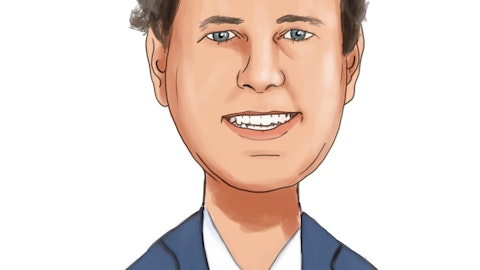Operator: Thank you. Our next question is from Yi Chen with H.C. Wainwright. Please proceed with your question.
Yi Chen: Hi, thank you for taking my questions. My first question is, could you elaborate on the potential in China for the pneumonia product and also the new Unyvero A30 platform in terms of how many more — how much more clinical work needs to be done, what is the time frame for potential regulatory approval and market entry. Thank you.
Oliver Schacht: Sure. I mean, look, on the A50 HPN pneumonia panel, nothing has changed. So in terms of the potential, that contract has been unchanged in the last couple of years during COVID. As we said, over an 8-year period post NMPA approval, that would be up to $180 million. And if you go back to the 2020 S-4 filing that OpGen did, again, the facts have not changed in terms of number of instrument systems. It’s up to 360 Unyvero systems and up to 1.5 million pneumonia, cartridge or HPN, whatever it’s going to be branded as in China, Unyvero cartridges over that 8-year period. In terms of time line, again, no change to the guidance we’ve previously provided from the time when we received the information that the NMPA has changed its regulatory process to a new electronic submission, that 24 to 30 month window started counting then.
So again, with an opportunity to get the clinical study underway during the course of 2023. And then obviously, depending on the final details of that clinical study, we’ll update once we have visibility on start date and likely enrollment time line and that’s the last missing data piece, if you will, to submission because everything else pertaining to the instruments, all of the analytical testing, all other data that is required for the NMPA submission is already available today. So again, there is no changes to that time line. It all boils down to when the study can get started in China. I think what has changed in the last three months really is China as you turn on the Zero COVID policy and definitely a much brighter prospect for our partners to be able to go into these hospitals and start working with the team.
We have a team that is bound for China here in the second quarter and that we anticipate our team to work alongside the Beijing Clear Bio team to put everything in place to get the study running.
Yi Chen: I was going to ask, do you expect the competition from local product offerings or other international product offerings in China.
Oliver Schacht: At this point, we do not see another local Chinese pneumonia cartridge Sample-To-Answer based product in clinical trials or anywhere near that stage. We can never exclude that from happening. But at this point, we don’t have any visibility on other pneumonia panels coming on an integrated platform. And given the breadth of the panel, the multiplexing degree, et cetera, it would be very surprising to see something come out of nowhere. Now on the A30, we have not given any guidance. And at this point, we’re not in a position to provide specific guidance on a potential transaction or partnership-type arrangements. But suffice it to say that it will be a very proactive approach because we believe specifically in China, there’s a great product market fit for the A30.
If you think about the much smaller footprint, the much lower cost of goods, much faster turnaround time and the versatility of developing and manufacturing products in China, we’re certainly excited about engaging in discussions and seeing how to leverage and monetize that asset in a geography that frankly, we would never be able to begin doing ourselves.
Yi Chen: Thank you. And my second question is, could you comment roughly how many more new contracts do you expect to secure in 2023 for the Acuitas Panel?
Oliver Schacht: We’re not providing specific guidance at this point in 2023. We’ll need some real-world feedback from the first quarter. But at this point, it’s simply premature to provide a guidance on a number of contracts.



